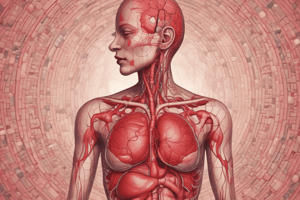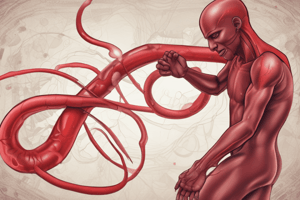Podcast
Questions and Answers
What is anemia?
What is anemia?
- A condition in which the amount of red blood cells or hemoglobin in the body is less than normal. (correct)
- A condition in which the body has too many red blood cells.
- A type of lung disease.
- A type of heart disease.
What is angina pectoris?
What is angina pectoris?
- A type of heart failure.
- Difficulty breathing.
- Swelling in the veins.
- Chest pain, pressure, or discomfort. (correct)
What do anti-embolic stockings help prevent?
What do anti-embolic stockings help prevent?
- High blood pressure.
- Shortness of breath.
- Heart attacks.
- Swelling and blood clots. (correct)
What is the function of an artery?
What is the function of an artery?
What are the upper two chambers of the heart called?
What are the upper two chambers of the heart called?
What are capillaries?
What are capillaries?
What is cardiomyopathy?
What is cardiomyopathy?
What is congestive heart failure (CHF)?
What is congestive heart failure (CHF)?
What is coronary artery disease (CAD)?
What is coronary artery disease (CAD)?
What is diastole?
What is diastole?
What is the primary function of the heart?
What is the primary function of the heart?
What is hypoxia?
What is hypoxia?
What is ischemia?
What is ischemia?
What is myocardial ischemia?
What is myocardial ischemia?
What does nitroglycerin do?
What does nitroglycerin do?
What is occlusion in the context of blood vessels?
What is occlusion in the context of blood vessels?
What is orthopnea?
What is orthopnea?
What is peripheral vascular disease (PVD)?
What is peripheral vascular disease (PVD)?
What is phlebitis?
What is phlebitis?
What is pulmonary edema?
What is pulmonary edema?
What is stable angina?
What is stable angina?
What is systole?
What is systole?
What is unstable angina?
What is unstable angina?
What does a vein do?
What does a vein do?
What are ventricles?
What are ventricles?
What is blood?
What is blood?
What removes carbon dioxide from the body?
What removes carbon dioxide from the body?
The heart is composed of ___ main chambers: the ___ and the ___.
The heart is composed of ___ main chambers: the ___ and the ___.
A function of blood is to transport oxygen, ___, hormones, salts, and antibodies to cells.
A function of blood is to transport oxygen, ___, hormones, salts, and antibodies to cells.
Plasma is made up of mostly ___.
Plasma is made up of mostly ___.
Platelets cause the blood to ___, preventing excess ___.
Platelets cause the blood to ___, preventing excess ___.
Match the following types of angina with their definitions:
Match the following types of angina with their definitions:
What is prehypertension?
What is prehypertension?
What is pernicious anemia?
What is pernicious anemia?
What do erythrocytes, leukocytes, and thrombocytes have in common?
What do erythrocytes, leukocytes, and thrombocytes have in common?
What gives blood its red color?
What gives blood its red color?
What is the most common type of peripheral vascular disease?
What is the most common type of peripheral vascular disease?
Study Notes
Key Terms and Definitions
- Anemia: Decreased red blood cells or hemoglobin in the body.
- Angina Pectoris: Chest pain or discomfort due to coronary artery disease (CAD).
- Anti-embolic Stockings: Special stockings worn to prevent blood clots and improve circulation.
- Artery: Blood vessels carrying blood away from the heart.
- Atria: Upper chambers of the heart (right and left atrium).
- Capillaries: Small vessels facilitating gas, nutrient, and waste exchange between blood and cells.
Cardiovascular Conditions
- Cardiomyopathy: Weakening of the heart muscle affecting blood pumping efficiency.
- Congestive Heart Failure (CHF): Heart fails to pump effectively, failing to meet the body's activity needs.
- Coronary Artery Disease (CAD): Damage and narrowing of coronary arteries leading to reduced blood supply to the heart.
- Myocardial Ischemia: Insufficient blood supply to heart muscle, leading to cell death.
- Pulmonary Edema: Accumulation of fluid in the lungs, typically from heart failure.
Heart Function and Phases
- Diastole: Relaxation phase of the heart.
- Systole: Contraction phase where blood is pumped out of the left ventricle.
- Heart Structure: Composed of four chambers—two atria and two ventricles.
Blood Components and Functions
- Blood: Transports oxygen, nutrients, hormones, salts, and antibodies; removes carbon dioxide and waste.
- Platelets: Important for blood clotting to prevent excessive bleeding.
- Erythrocytes, Leukocytes, Thrombocytes: Types of blood cells—red blood cells, white blood cells, and platelets, respectively.
- Plasma: Liquid part of blood, primarily composed of water.
Respiratory and Circulatory Interactions
- Oxygen and Carbon Dioxide Exchange: Occurs in the lungs; carbon dioxide is exhaled while oxygen is inhaled.
Cardiovascular Response to Aging
- Heart pumps less efficiently, leading to narrowed and less elastic blood vessels, resulting in decreased blood flow.
Specific Conditions and Symptoms
- Stable Angina: Chest pain during physical activity or stress.
- Unstable Angina: Chest pain at rest or minimal exertion.
- Left-Sided CHF Symptoms: Includes fatigue, orthopnea, coughing, rapid pulse, and weight gain.
- Right-Sided CHF Symptoms: Includes fatigue, weakness, edema in extremities, bulging neck veins, and irregular heartbeat.
Vascular Diseases
- Peripheral Vascular Disease (PVD): Insufficient blood circulation to extremities.
- Peripheral Arterial Disease (PAD): Most common type of PVD.
Other Important Terms
- Occlusion: Complete obstruction of a blood vessel.
- Hypoxia: Insufficient oxygen supply to the body.
- Prehypertension: Increased risk of developing high blood pressure in the future.
- Nitroglycerin: Medication that relaxes coronary artery walls for improved blood flow.
Studying That Suits You
Use AI to generate personalized quizzes and flashcards to suit your learning preferences.
Description
Explore key terms and definitions related to the circulatory system in this CNA Chapter 19 quiz. Enhance your understanding of cardiovascular health with flashcards covering conditions like anemia and angina pectoris, as well as preventive measures like anti-embolic stockings.




